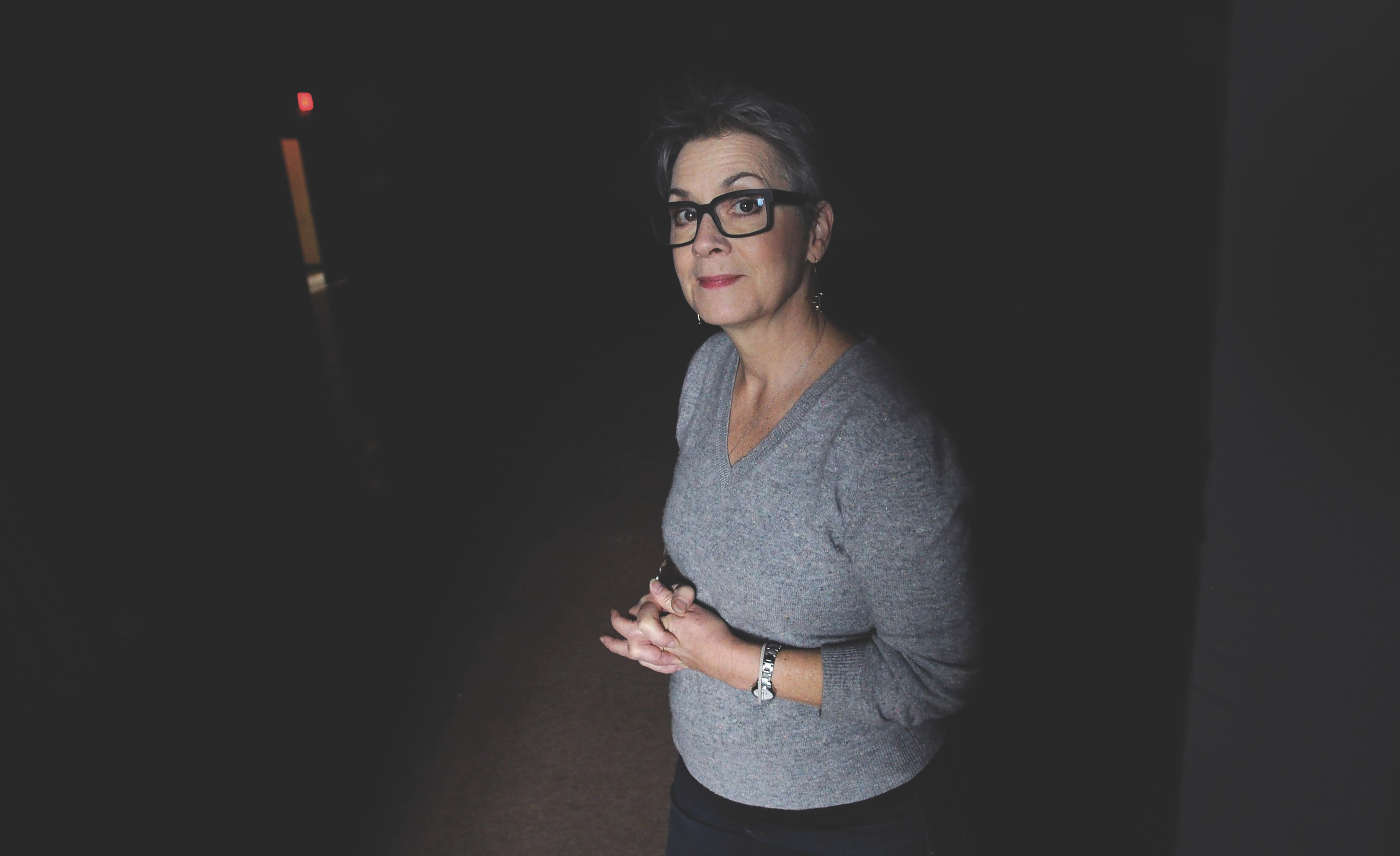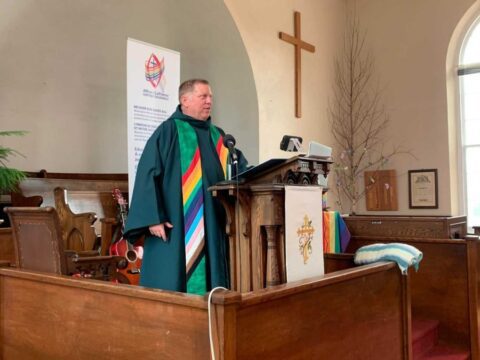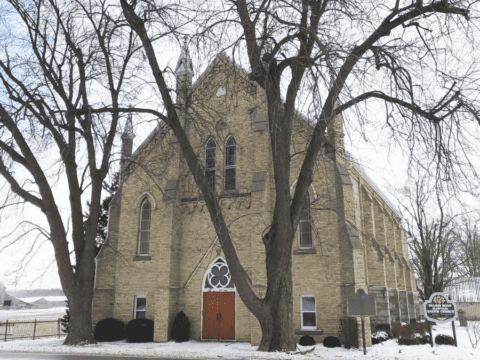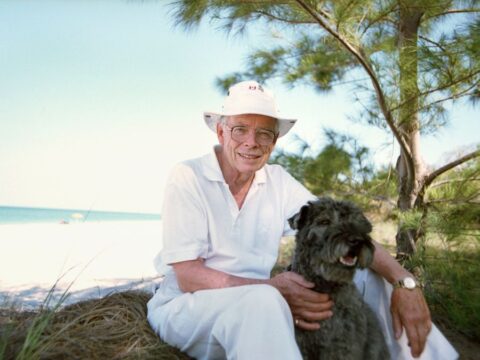Alone at the front of the West Hill United sanctuary, Rev. Gretta Vosper welcomes about 80 regulars and visitors to the Toronto community of faith’s Sunday morning gathering. Behind her, strands of multicoloured streamers cascade from the high ceiling of the 1960s-era building, almost obscuring a huge steel cross on the wall. Below the streamers are free-form tapestries in rainbow hues. It’s their third Sunday back in this sanctuary since a damaged roof forced the congregation to temporarily relocate to a neighbouring church.
A booklet for newcomers says the tapestries signify “a journey from pain and brokenness to healing and wholeness.” It’s a fitting image for this congregation and its self-professed atheist minister, and perhaps for the wider church as well. On Nov. 7, 2018, just a few weeks before this particular Sunday morning, Vosper and her congregation settled a long and difficult dispute with The United Church of Canada’s Toronto Conference over whether a minister who doesn’t recognize the Trinity, or the primacy of Scripture, and doesn’t believe in God, belongs in the pulpit.
You may unsubscribe from any of our newsletters at any time.
For three-and-a-half years, as the question worked its way through the church’s bureaucracy, ministers and members across Canada made impassioned pleas for either her inclusion within the United Church’s “big tent” or her dismissal as an unsuitable leader in a Christian church.
And while the settlement allows Vosper to continue her ministry within The United Church of Canada, the cloak of confidentiality that descended over the reasons behind the agreement, or any significant details pertaining to it, means the case is far from being decided in the court of public opinion.
“Both parties took a long look at the cost-benefit at running a heresy trial and whether it was good for anyone [and] the results speak for themselves.”
Vosper began openly calling herself an atheist in 2013, but it wasn’t until two years later, after she publicly criticized the church’s moderator for his prayer for the victims of a Paris terrorist attack, that Toronto Conference sought a way to challenge her. General Council’s general secretary Nora Sanders gave Toronto Conference the unprecedented go-ahead to use the Conference’s interview committee — a body that screened new candidates for ministry — to review Vosper’s suitability for ministry by asking her to revisit church ordination vows.
Toronto Conference’s 24-member interview committee decided in 2016 that she was no longer in “essential agreement” with The United Church of Canada statement of doctrine and was “unwilling and unable” to reaffirm the vows she made when ordained in 1993. They found her “unsuitable” for United Church ministry.
After the review, Vosper urged Toronto Conference’s sub-executive for open debate or dialogue instead of the next step, a hearing to defrock her. “Dialogue not Discipline” was the rallying cry for Vosper’s supporters.
Toronto Conference pressed onward, asking the General Council to convene a formal hearing to consider placing Vosper on the church’s Discontinued Service List (Disciplinary) — which would essentially fire her from ministry in The United Church of Canada.
Throughout the process, calls came from across the church for studies and discussions of doctrinal and theological issues related to Vosper’s review. General Council, its Executive and Toronto Conference voted them all down. Only Toronto Southeast Presbytery hosted a day-long discussion.
Early last November, a dialogue did finally take place behind closed doors at Arbitration Place in Toronto. It included Vosper, the chair of her congregation’s board, Toronto Conference officials and their three respective teams of lawyers.
Two days were originally designated for pre-hearing motions, but quickly morphed into an unscheduled mediation process led by Justice Stephen Goudge, a retired judge who also presided over unsuccessful mediation sessions earlier last year. He was at Arbitration Place for another matter that was resolved earlier than expected, freeing up time in his day to restart the conversations. A settlement was reached and approved by the three formal hearing panel members.
The denomination’s website announced the decision in a terse 45-word statement: “Toronto Conference, the Rev. Gretta Vosper, and West Hill United Church have settled all outstanding issues between them. The Rev. Vosper will remain in ordained ministry at West Hill. We acknowledge the faithful work of all of those who have been involved in the process.”
Church leaders tried, through official follow-up statements and comments from the moderator, to assure people that the United Church believes in God, that Toronto Conference was the only court of the church involved and that the church would be praying for all. But with no reference to the reasoning behind the decision, the news set many on edge.
Orthodox or traditional United Church folks see it at best as an unsatisfactory solution and at worst, a betrayal. Agnostics and atheists in the pews and pulpits are unclear about whether their views are now widely acceptable, or still pose a threat to their acceptance or employment in the denomination. And those who embrace mainline concepts of God are caught in the middle.
Even in Vosper’s congregation, where the decision might seem like a victory, some are experiencing anger over the years of personal and communal stress and missed opportunities to move their ministry forward. Questions linger about a church process that was custom-made to force their minister to revisit her ordination vows.
Beyond the upset, there’s plenty of speculation about what actually led to the settlement and what it means. For now, the truth can only be sought in the cracks between known facts and likely outcomes.
“Both parties took a long look at the cost-benefit at running a heresy trial and whether it was good for anyone [and] the results speak for themselves,” Vosper’s lawyer, Julian Falconer, told the Canadian Press. Even though the formal hearing was called off, the financial costs on both sides were substantial. Vosper’s legal fees are about $220,000. The Friends of Gretta Vosper Association has raised $80,000 toward that amount and fundraising continues. Toronto Conference paid $170,000 for legal counsel, plus $20,000 in per diems and $10,000 for travel, accommodation and food.
General Council tallied $25,000 in legal fees in 2016, when Vosper appealed Sanders’ ruling requiring her to revisit her ordination vows. Costs for the cancelled hearing, including travel costs for the panel plus room and meeting costs, are about $60,000.
That adds up to $505,000, without including the cost of West Hill United’s legal counsel or the time of General Council’s two staff lawyers, its full-time theologian Rev. John Young, or the many staff involved in Conference, Presbytery and General Council meetings, where related issues were aired.
With General Council trying to balance its budget and many communities of faith struggling to survive, the financial cost of removing a minister for her beliefs may have begun to look too high.
Vosper, 60, had already spent much of her life savings on legal fees but seemed determined to continue defending herself, her congregation and her beliefs. Still, her status may have created the roadblocks her congregation encountered as it was trying to relocate to rented space. A 2016 proposal to sell its property was turned down by Presbytery. Then, before funds for costly repairs could be arranged, the church’s roof was significantly damaged, resulting in a huge cleanup and about $180,000 in emergency renovations. When the formal hearing was set to begin, West Hill United was holding its Sunday gatherings at the nearby Church of the Master. It moved back into its old building in December. The non-financial costs of a hearing were also likely factors in the church’s willingness to settle.
At the time when the hearing was set to begin, the official launch of a new administrative and governance structure was weeks away. Six years in the making, it promised increased autonomy for communities of faith. But how would this greater independence apply to West Hill? It had followed all church rules and supported Vosper. While seeking official standing at Vosper’s formal hearing, Randy Bowes, chair of West Hill’s board, said he tried to “get rid of this concept that Gretta is the shepherd and we are the sheep.” If General Council’s formal hearing panel decided to get rid of Vosper, he asks, what would prevent West Hill United from calling a minister with similar views and beliefs?
Toronto Conference may have decided the United Church’s big-tent theology was not big enough to include Vosper. But how much of the church’s spiritual capital was it willing to spend to get rid of her?
And the greatest unknown: what would be the fallout of a highly publicized open hearing, one that might also have been live-streamed online? For the church, Vosper and her congregation, the stakes were high.

Vosper may be an atheist, but her beliefs and values were forged in the United Church. Raised in Kingston, Ont., she was first exposed to critical approaches to faith via the United Church’s 1960s-era New Curriculum. She did undergraduate studies at Mount Allison University in Sackville, N.B., and theology at Queen’s University in Kingston. She was ordained in 1993 and has served West Hill United since 1997.
As an author, Vosper made waves with her 2008 Canadian bestseller, With Or Without God: Why the Way We Live is More Important Than What We Believe. In it, she writes, her intention is “to provide a model for a way of life, a way of faith, a way of gathering together for those who either do not believe in the supernatural elements of religion or do believe but do not feel we can make absolute, universal claims about it.” She’s spoken across Canada and in the United States, the United Kingdom and New Zealand; arguably, she is the best-known United Church minister in Canada.
Her congregation is also among the most unorthodox in the denomination. West Hill United’s regularly updated “guiding document,” called VisionWorks, says: “With roots in the Judaeo-Christian tradition, we embrace theists, agnostics and atheists. What we share is a reverence for life that moves us to seek truth, live fully, care deeply, pursue justice and make a difference in the world.”
In 2009, West Hill adopted the Affirming program for congregations welcoming people of all sexual orientations and gender identities. It also sponsors refugees, has an active First Nations study group focused on reconciliation and financially supports the Mission & Service of the United Church.
After her review, Vosper and her supporters worked hard to build support and understanding through a speaking tour they called West Hill Wants to Talk. In 2017, Vosper and members of her congregation took part in events at United churches in Victoria, Edmonton, Kingston, Ont., Montreal, Fredericton and Shelburne, N.S. Leading up to the formal hearing, her supporters used the hashtag #heresytrial to describe and publicize it. The effort caught the attention of U.S.-based Vice News Tonight, which came to Canada with a video crew.
While Vosper can’t reveal the details of her settlement, she does describe the two days leading up to it. There were “conversations non-stop Monday and Tuesday,” between her, Toronto Conference representatives and their lawyers, she said in an interview the day after the settlement was announced. Arbitration Place was shut down late Tuesday, she said, when an agreement was reached and approved by the hearing panel.
She said that while the whole ordeal put into question “everything I stood for,” the conversation she had with Toronto Conference through their respective lawyers “has validated that and allowed it . . . to continue on in the United Church.”
Rev. Jody Maltby, the designated spokesperson for the Toronto Conference sub-executive, also describes the day the settlement was reached. Earlier that Tuesday, seven sub-executive members met for an hour by conference call to consider a settlement. She says the group “listened carefully and prayerfully to one another and made this decision [to settle] under the guidance of the Holy Spirit moving in the discussion during the meeting.”
Maltby can’t provide any more details about the settlement, except to make clear that it “does not constitute a change in church policy. In our system, this does not pre-determine the outcome of any future personnel situations.”
For Vosper, the settlement was a relief. Initially, leaders in her congregation seemed jubilant. The first message to their e-mail list began with a phrase that is part of all West Hill gatherings: “Love abounds!”
General Council, for its part, opted for message control, sending an e-mail to church leaders announcing the settlement and offering Vosper-related talking points: “People use that word atheist in different ways. This is a unique situation; it is one matter in one area of the country. And the local body that is responsible for discipline has made its decision. We are not privy to the terms of settlement. And this decision would not pre-determine the outcome for any future situation, this is a unique case.”
Immediate reactions ranged from approval to calls for her resignation. Toronto Star columnist Rosie DiManno referred to “the cult of Gretta Vosper,” and called her congregation’s support “idolatrous.” In the Vancouver Sun, Rev. Jason Byassee, a Vancouver School of Theology professor, wrote that Vosper “takes it upon herself to speak as though she were some sort of pope of the United Church” and called on her to “do the honest and decent thing and move along.”
“One of my biggest concerns is that General Council is treating this issue like a dead skunk in the road — roll up the windows and get away from it as quickly as possible.”
Also in the Vancouver Sun, religion writer Douglas Todd — who called for Vosper’s resignation even before her review — portrayed the unexplained settlement as a victory for Vosper and said “the silence means the denomination’s lack of clarity about what it stands for will insidiously drag on.” United Church people, he wrote, “will find the denomination’s leadership increasingly hard to fathom, and most likely irrelevant.” In the New York Times, writer Catherine Porter noted, “In a country where thinning congregations have led to many church sanctuaries being converted into condominiums, Ms. Vosper’s outspoken views have stirred an existential passion.”
Within the United Church, you’d be hard pressed to find a person in a pew without an opinion on the Vosper decision. Bill Wall, a retired minister on the Discontinued Service List (Voluntary), former executive secretary of Saskatchewan Conference and a longtime Vosper supporter, says he’s concerned about what looks like General Council distancing itself from the situation, even though the general secretary gave Toronto Conference a means to challenge Vosper by having her revisit her ordination vows. “Another thing that was implied among the statements,” he says, was not to “assume if you’re in ministry in the United Church you can declare your atheism; this was a special case.” He doubts any other ministers will want to test that.
Wall is not alone in his sense that — despite the settlement — the Vosper case won’t help the cause of progressive or liberal theology in the United Church. Retired ministers Rev. Mac Campbell and Rev. Murray McFarlane and lay person Gail Wylie helped to welcome Vosper to Fredericton for an event in 2017. They share Wall’s fears for the church’s non-traditional Christians. Says Campbell: “One of my biggest concerns is that General Council is treating this issue like a dead skunk in the road — roll up the windows and get away from it as quickly as possible.”
Wylie says she always thought that “being in the United Church meant you were on a pathway to explore what you believe.” McFarlane wonders what the settlement means for the United Church’s new Office of Vocation, which now handles oversight and discipline of ministers. If another atheist minister were to step forward today, and concerns about that person were raised, the matter would be handled by the Office of Vocation’s six-member response committee before going to the five-member remedial committee. Appeals would go to the Board of Vocation. But would Nora Sanders’ suitability test be applied, requiring another atheist minister to revisit his or her ordination vows?
“It is not for me to pre-judge how the Office of Vocation might deal with any future complaints that come forward,” says Sanders, adding that she was not consulted about Toronto Conference’s settlement with Vosper.
She does confirm in an e-mail that questions of ministers’ evolving or changing belief could be on the table. The Office of Vocation “has an obligation to examine any complaint received about a minister, including any complaint that a minister is no longer congruent with, or in alignment with, their ordination/commissioning/admission (etc.) vows. Through its Response Committee, the Office would then determine the most appropriate course to follow in that situation.”
Moderator Rt. Rev. Richard Bott wants to encourage the church to continue theological discussions going forward. “We need to have a dialogue about what we mean when we say ‘God,’ what do we mean when we say ‘Christ,’ what do we mean when we talk about the ‘Holy Spirit’,” he says. “And what do we mean when we talk about the importance of belief or the importance of action or how those two interact together. Whether or not it’s a difficult conversation, it’s an important one for us to be having.”
But can the church legitimately state that it welcomes open dialogue on what we mean by “God” right after it has spent three years denying requests for official discussion on Vosper-related topics and implying that disbelief in God is not appropriate for its ministers? Even some who support traditional tenets of Christianity are not sure more discussion will add clarity about what the United Church believes.
In his recent book, Who’s Minding the Story? The United Church of Canada Meets a Secular Age, Rev. Jeff Seaton, a former United Church minister turned Anglican in Vernon, B.C., looks closely at the denomination’s response to secular forces — using Vosper and her work at West Hill United as one example. He calls for “progressive orthodoxy,” a refusal to throw away the Gospels while also committing to social justice. He agrees with Vosper’s critique of liberal churches that keep up Christian appearances in liturgy while playing down or disavowing their meaning. “Vosper is calling time on the zombie liberal church and challenging it to be reborn in a new form,” he writes.
The church’s settlement with Vosper, says Seaton in an interview, is probably the right one, because “theological nebulousness has been a defining characteristic of the United Church; to begin drawing hard theological lines would be somewhat out of character.”
Cruxifusion, a group of United Church clergy who, according to their website, “consider their ministries centred on Jesus Christ, our Lord,” decided to make no official comment on the Vosper decision, says its vice-chair, Rev. Greg Smith-Young, minister at the Elora-Bethany (Ont.) pastoral charge. Speaking only for himself, Smith-Young says, “I was glad to see the national church reiterate that we have beliefs, we have doctrine, that God is Trinitarian. And that this [settlement] hasn’t changed that one bit.” Myra Spence, on the other hand, thinks the church’s settlement with Vosper “shakes the foundation of the church. What stops anybody from doing anything?” A retired teacher and lay preacher at St. Paul’s United in Deer Lake, N.L., Spence says she and other members of her congregation are already talking about possibly leaving the United Church. The settlement is just part of the “feeling of disconnect” she and her congregation have had with the wider United Church.
Spence has a degree in biblical studies and has read Vosper’s With Or Without God, but disagrees with its conclusions. “I’m not a fundamentalist, but through it all I believe in God.” Spence wonders why the General Council left it to Toronto Conference to deal with what she calls a “denomination-shaping issue relating to public witness,” adding, “People are not pleased with the church. And I think this is the straw that breaks the camel’s back.”
Ken Ramsay of Toronto, a former member of Vosper’s congregation and a former General Council staff fundraiser who knows the United Church well, also thinks the Vosper settlement has broad implications. He says it “just put a wedge down the centre of the church. . . . This is not the way we, as a church, should deal with an issue like this. It could have been a rich time.” All sides of the issue could have had a platform, he says. “Finding common ground is what the United Church is good at, or has been historically. We missed an opportunity and did the opposite.”
After West Hill United’s Sunday morning gathering comes to an end and coffee cups are being washed in the kitchen, Vosper sits in the empty gathering hall weighing the good and bad of the previous three-and-a-half years.
First, the good: “The review has galvanized the community. There is not a person here who cannot articulate exactly why they are here, why what we are doing is important, and why we believe it is a significant ministry in The United Church of Canada that is in line with its traditional trajectory and that can continue its work beyond its traditional demographics.”
But it’s come at a cost. The congregation has endured years of stress and anxiety, and that has led some to leave the community.
Still, new members are regularly welcomed and faithful followers come to gatherings and events from across Toronto and beyond. But what of Vosper’s long-stated aim of “irritating the church into the 21st century,” a phrase she still uses in her Twitter profile?
In her 2017 book, Time Or Too Late: Chasing the Dream of a Progressive Christian Faith, she writes, “The struggle to engage Christianity in such a way as to shift its focus so that it might share its benefits with those beyond belief is virtually over.” What remains, writes Vosper, is “the work of creating the communities that will replace churches as sites where values are named and shared, relationships are built, and well-being is fostered.” Vosper and West Hill United remain dedicated to that task, within The United Church of Canada.
This story originally appeared in the 2019 March/April issue of The United Church Observer with the title, “The Vosper Decision.”
To read more of Broadview’s award-winning content, subscribe to the magazine today.















All this discussion about correct belief and doctrine makes me ill. We are called Christians, which means Christ-followers. We are not baptized as United Church; we are baptized Christian. As such our mandate and ethos is to follow Jesus, who certainly irritated those who were determined to correct his incorrect beliefs. Ignoring ‘correct’ belief, Jesus built a community based on shared values, and caring about the well-being of all. For example, the Samaritan was honoured as the one who was a good neighbour – because he was a good neighbour, not because he had ‘correct’ belief. Jesus often commented on the belief he noted in people he healed – belief that Jesus was able and willing to help them, not any “correct” doctrine. Jesus was talking about relationship between people. He was deeply moved that people believed in him as a caring, compassionate and wise human being, and for that he gave thanks. A model of ministry I seek to emulate.
None of us no the details of the settlement.
I believe Jesus taught that a house divided against itself cannot stand. Thats sound teaching of Jesus.
I believe the building should be deconsecrated since God is no longer worshipped there. Ms Vosper and her Council should have enough integrity to allow the church to deconsecrate her building. Since she does not believe in God. I would be happy to do it for her.
“Could” redefine the United Church? It’s now too progressive to be Christian. I guess that’s part of the cost-benefit analysis.
Happily we can now all ask “What would Gretta do?”